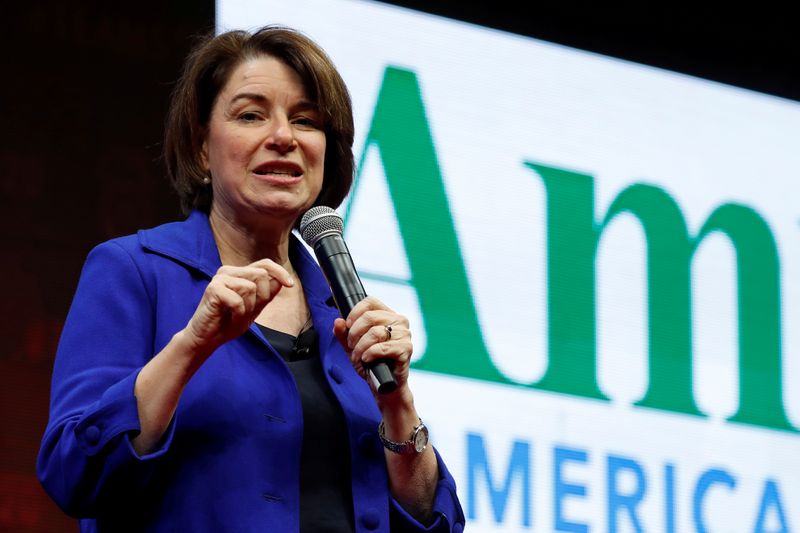By Simon Lewis
WASHINGTON (Reuters) - Democratic presidential candidate Amy Klobuchar on Wednesday said she would rebuild U.S. foreign alliances and take tougher stances on U.S. relations with China and Russia than President Donald Trump if she is elected.
"We don't seek conflict with China or Russia, but we are also not going to allow them to break up the international system that has enabled peace, stability, and prosperity," she said in a speech at the Council on Foreign Relations in Washington.
Trump has provided military aid to Ukraine to help it fight Russian-backed separatists, but critics say other policies, like the withdrawal of U.S. forces from northern Syria, have aided Russian leader Vladimir Putin. He has introduced tariffs on Chinese goods, igniting a trade war, but has not been eager to criticize China over human rights abuses.
Foreign policy has not been front and center in the nominating contest, in which 15 Democrats are competing to take on Trump in the November 2020 election, beyond criticism of Trump's diplomatic style.
But progressive U.S. Senators Bernie Sanders and Elizabeth Warren have contrasted their dovish foreign policy approaches with former Vice President Joe Biden, who is leading in the polls and emphasizes restoring U.S. alliances like the North Atlantic Treaty Organization (NATO).
Klobuchar said she would recommit the United States to NATO and strengthen sanctions to combat what she called Putin’s "aggression."
She said the United States should speak out about China's treatment of Uighur Muslims and the crackdown on protesters in Hong Kong, although she said those issues should be not be part of trade negotiations with China.
"We don’t want to prevent China from growing and succeeding, but we do want to prevent it from doing so at the expense of others, including Americans," she said.
She dismissed Trump’s seemingly tough stance on China as “rhetoric” and said his trade war was costing U.S. jobs
Like other Democrats, Klobuchar would strengthen U.S. diplomacy, but was also committed to "maintaining our military superiority over any adversary that would challenge us," she said, adding "duplicative and unnecessary" military spending should be reviewed.
Klobuchar only gets between 2% and 3% in most nationwide polls on the Democratic nominating contest but has polled better in some states that vote or caucus early.

An Emerson (NYSE:EMR) College poll in Iowa conducted between Dec. 7 and 10 found that 10% of Iowans would support Klobuchar in that state's Feb. 3 caucuses, the first in the nation.